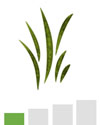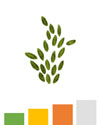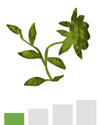University of Worcester's pollen forecast and fungal spore forecast for the UK.
Weekly pollen and fungal spore forecast summary
Forecast to Friday 20th February 2026, for West Midlands: Pollen: risk of high alder and hazel during dry, mild days; Spores: low to high for aspergillus/penicillium types.
Grass Pollen Count - Low

Grass pollen risk will be very low or zero until next Spring.
Tree Pollen Count - Moderate

There is a chance of high alder and hazel pollen on any dry, mild days, although the risk will often be low due to high humidity. Cypress and elm pollen also airborne.
Fungal Spore Levels - High

A high risk from Aspergillus/penicillium types is possible during dry, mild days but the risk will often be low due to high humidity.
Weed Pollen Count - Low

Weed pollen risk pollen risk will be very low or zero until next Spring.
School of Science and Environment
If you are interested in our pollen forecast, you may also be interested in our courses.